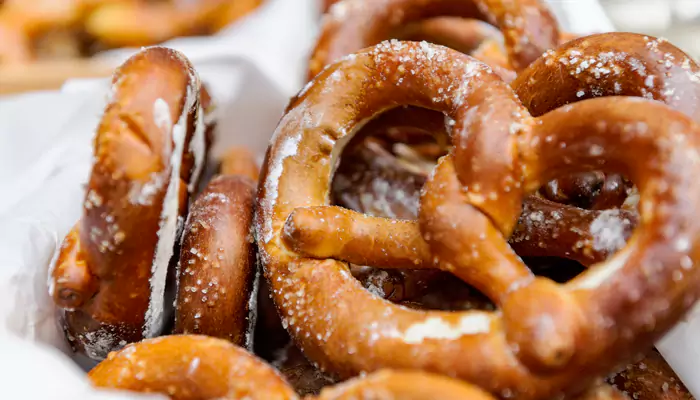A Vegan’s Guide To German Bakeries: Pastries, Pretzels, And More
Germany is famous for its bakeries, offering a mouthwatering array of pastries, breads, and pretzels that tempt locals and tourists alike.
- Ishani Karmakar
- 06 March, 2025
- 2 mins ago

A Vegan’s Guide To German Bakeries: Pastries, Pretzels, And More
Germany is famous for its bakeries, offering a mouthwatering array of pastries, breads, and pretzels that tempt locals and tourists alike.
But if you’re a vegan, navigating these delights can be a bit of a challenge. However, with a bit of knowledge and a sense of adventure, you can still enjoy a range of delicious vegan options at German bakeries. Here’s your guide to savouring the best vegan-friendly treats in Germany.
The Traditional German Bakery Experience
Walking into a German bakery is like stepping into a world of warmth and comfort. The aroma of freshly baked bread, the sight of golden-brown pretzels, and the rows of beautifully decorated pastries are enough to make anyone's mouth water.
Even in bakeries that don't explicitly advertise vegan options, you can often find some pleasant surprises. Understanding what to look for and how to ask for vegan options can make all the difference in enjoying the full bakery experience without compromising your dietary choices.
Vegan Pretzels
Pretzels, or "Brezeln" in German, are an iconic part of the country's culinary heritage. The good news for vegans is that traditional pretzels are often vegan by default. Made simply with flour, water, yeast, and salt, they don’t usually contain non plant-based products.
When in doubt, ask for a “Brezel ohne Butter” (pretzel without butter). You’ll still get that delightful chewy texture and slightly salty taste that makes pretzels a beloved snack throughout Germany. Whether enjoyed on their own, with mustard, or as part of a meal, pretzels are a go-to vegan-friendly option that you can find in almost any bakery.

Vegan Pastries
Pastries are where things can get a bit trickier for vegans. In cities like Berlin, Munich, and Hamburg, you’ll find vegan bakeries or conventional bakeries with a dedicated vegan section. These establishments offer a variety of pastries made with plant-based margarine, almond or oat milk. From vegan “Schwarzwälder Kirschtorte” (Black Forest cake) to vegan croissants, the options are expanding.
If you’re exploring smaller towns or more traditional bakeries, vegan pastries might be harder to find. In these cases, opting for simple fruit-filled pastries or those marked as “ohne Ei und Milch” can be your best bet. Apfelstrudel, a classic German apple pastry, is often vegan or can be made vegan upon request, especially if you skip the vanilla sauce.
Bread
Bread, or “Brot,” is the cornerstone of German baking. With hundreds of varieties available, many of which are naturally vegan, you’ll have no shortage of options. Rye bread, sourdough, spelt bread, and multigrain loaves are a safe and satisfying choice for vegans.
For a more authentic experience, try “Vollkornbrot” (whole grain bread), a dense and hearty loaf that is packed with flavour and nutrients. Pair it with some vegan spreads or fresh avocado for a delicious and wholesome meal.
Additionally, flatbreads like “Fladenbrot” and rolls such as “Brötchen” are often vegan. Just be cautious with any breads that appear glazed.
Veganizing Your Bakery Experience
While vegan options are becoming more common, there might be times when you need to get a bit creative. Many bakeries are happy to accommodate special requests, so don’t hesitate to ask for modifications. For instance, if you see a sandwich or pastry that looks appealing, ask if they can prepare it without the non-vegan ingredients.
Exploring German bakeries as a vegan may require a bit of effort, but the rewards are well worth it. From the crisp, salty pretzels to the rich, satisfying breads, and even the occasional vegan pastry, there are plenty of options to indulge in. As the demand for plant-based foods continues to grow, the availability of vegan options in bakeries is likely to increase, making it easier than ever to enjoy these traditional treats. So next time you’re in Germany, don’t shy away from the local bakery. Embrace the experience, ask the right questions, and you might just discover your new favourite vegan treat.










